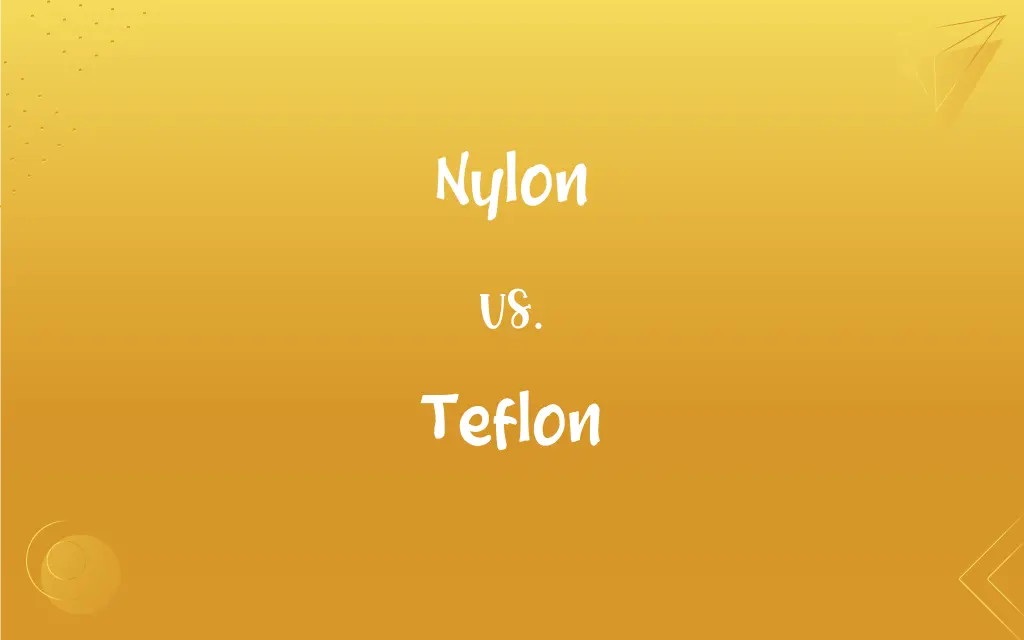Nylon vs. Teflon: What's the Difference?
Edited by Aimie Carlson || By Harlon Moss || Published on December 16, 2023
Nylon is a synthetic polymer, durable and flexible, often used in fabrics and ropes; Teflon is a brand of PTFE, non-stick and heat resistant, mainly used in cookware coatings.

Key Differences
Nylon, a synthetic polymer, is renowned for its strength and elasticity, making it ideal for textiles and industrial applications. Teflon, on the other hand, is a brand name for PTFE (Polytetrafluoroethylene), celebrated for its non-stick properties and heat resistance, commonly seen in kitchenware and protective coatings.
In terms of chemical structure, nylon consists of long chains of repeating units linked by amide bonds, contributing to its flexibility and toughness. Contrastingly, Teflon is composed of carbon and fluorine atoms, a combination that imparts remarkable chemical inertness and a low coefficient of friction.
When considering environmental factors, nylon degrades more readily than Teflon. Nylon's susceptibility to moisture and UV light can be a drawback, while Teflon exhibits excellent chemical and temperature stability, remaining inert in various environments.
The manufacturing processes of both materials differ significantly. Nylon is produced through a process called polymerization of caprolactam or adipic acid and hexamethylene diamine. Teflon, however, is synthesized by polymerizing tetrafluoroethylene, a process requiring different catalysts and conditions.
Applications of nylon and Teflon are diverse and distinct. Nylon's durability makes it a favorite for clothing, ropes, and automotive parts, while Teflon's low friction and non-reactivity make it ideal for non-stick cookware, electrical insulation, and lubricants.
ADVERTISEMENT
Comparison Chart
Chemical Structure
Polymers with amide linkages
Polytetrafluoroethylene (PTFE)
Primary Use
Textiles, ropes, automotive parts
Non-stick coatings, lubricants
Heat Resistance
Good, but less than Teflon
Excellent, withstands high temps
Environmental Impact
Biodegrades faster than Teflon
Extremely stable, slower to degrade
Properties
Strong, elastic
Non-stick, low friction
ADVERTISEMENT
Nylon and Teflon Definitions
Nylon
A synthetic thermoplastic polymer, often used in fibers and textiles.
The nylon jacket was both lightweight and durable.
Teflon
Used in various non-stick and low-friction applications.
The mechanic applied Teflon tape to the threaded joints.
Nylon
A material known for its high tensile strength and elasticity.
She replaced the broken guitar string with a nylon one.
Teflon
A brand name for PTFE, known for its non-stick properties.
She cooked pancakes on a Teflon-coated skillet without any sticking.
Nylon
Common in outdoor gear for its resistance to mildew and rot.
The hikers preferred nylon ropes for their climbing expeditions.
Teflon
Often used in electrical insulation due to its dielectric properties.
Teflon insulation was crucial for the high-voltage electrical wiring.
Nylon
Often used in carpets and upholstery for its durability.
Their new sofa was upholstered with high-quality nylon.
Teflon
Characterized by its high resistance to heat and chemicals.
The laboratory used Teflon containers for corrosive substances.
Nylon
Used in various industrial applications due to its abrasion resistance.
The machine gears were made of nylon for smoother operation.
Teflon
Polytetrafluoroethylene, PTFE
Nylon
Any of a family of high-strength, resilient synthetic polymers, the molecules of which contain the recurring amide group CONH.
Teflon
(metaphorically) Non-stick, slick.
Nylon
Cloth or yarn made from one of these synthetic materials.
Teflon
Able to easily shrug off or deflect criticism or blame.
The teflon Prime Minister
Teflon
A material used to coat cooking utensils and in industrial applications where sticking is to be avoided
Teflon
Not to be trusted;
How extraordinarily slippery a liar the camera is
They called Reagan the teflon president because mud never stuck to him
Teflon
Noted for its inertness and ability to withstand extreme conditions.
The spacecraft components were coated with Teflon for protection.
FAQs
What is nylon?
Nylon is a synthetic polymer commonly used in textiles and industrial materials.
Is nylon environmentally friendly?
Nylon is not highly biodegradable, raising environmental concerns.
Can Teflon withstand high temperatures?
Yes, Teflon has excellent heat resistance, making it suitable for cookware.
Are nylon products durable?
Yes, nylon is known for its durability and strength, especially in textiles.
Can nylon be recycled?
Yes, nylon can be recycled, but the process is complex.
Does Teflon react with chemicals?
Teflon is chemically inert and does not react with most substances.
Is nylon water-resistant?
Nylon absorbs some water but is generally considered water-resistant.
Does Teflon contain PFOA?
Modern Teflon products are typically PFOA-free.
Where is Teflon typically used?
Teflon is widely used in non-stick cookware and various industrial applications.
How is nylon made?
Nylon is made through a chemical process called polymerization.
Are there different types of nylon?
Yes, there are several types of nylon, each with specific properties.
Is Teflon safe for cooking?
When used properly, Teflon coatings are safe for cooking.
Can Teflon be used in microwave ovens?
Yes, Teflon is safe for use in microwaves.
Is nylon affected by UV light?
Yes, prolonged exposure to UV light can degrade nylon.
Is Teflon used in medical applications?
Yes, Teflon is used in some medical devices due to its inert and stable nature.
What are the main uses of nylon?
Nylon is used in clothing, ropes, automotive parts, and more.
Is Teflon coating scratch-resistant?
Teflon coatings can be prone to scratching, especially with metal utensils.
Can Teflon be repaired if scratched?
Scratched Teflon coatings are difficult to repair and usually require replacement.
Can nylon be melted?
Nylon can melt at high temperatures and should be kept away from extreme heat.
How long does Teflon last?
Teflon's lifespan varies depending on usage but can last several years with proper care.
About Author
Written by
Harlon MossHarlon is a seasoned quality moderator and accomplished content writer for Difference Wiki. An alumnus of the prestigious University of California, he earned his degree in Computer Science. Leveraging his academic background, Harlon brings a meticulous and informed perspective to his work, ensuring content accuracy and excellence.
Edited by
Aimie CarlsonAimie Carlson, holding a master's degree in English literature, is a fervent English language enthusiast. She lends her writing talents to Difference Wiki, a prominent website that specializes in comparisons, offering readers insightful analyses that both captivate and inform.






































































